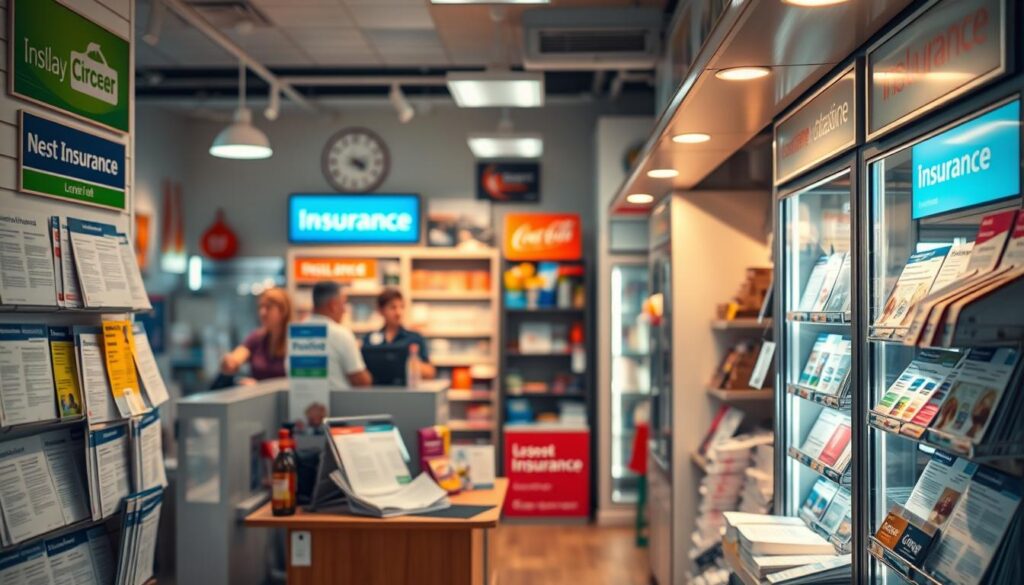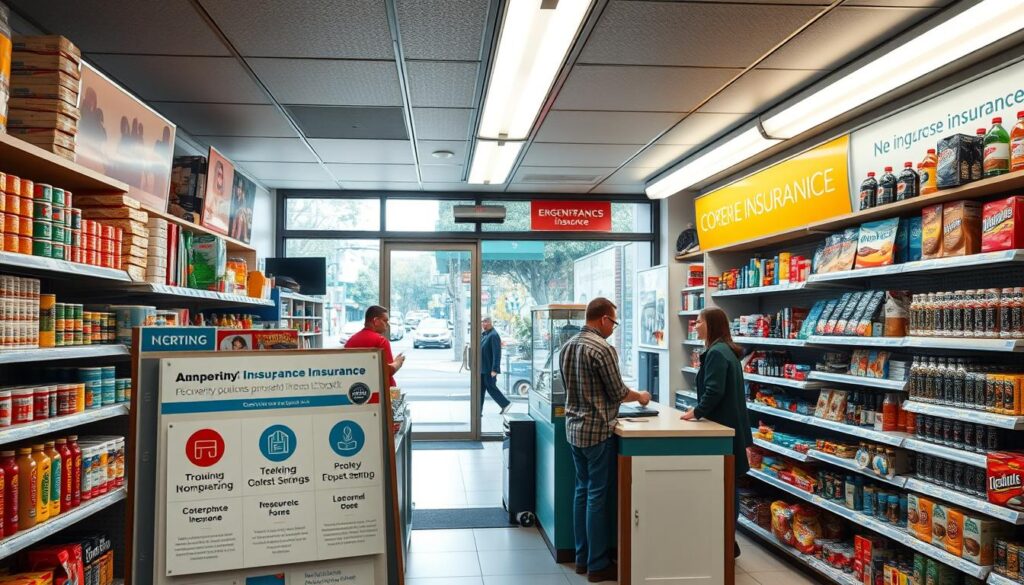Are you sure your c store is safe from unexpected risks?
As a convenience store owner, you deal with many risks every day. These include damage to property, liability issues, and risks related to employees. Without the right insurance coverage, one accident could harm your business’s finances.
Safeguarding your business means having insurance that covers all the important areas. This way, you’re ready for different risks.
Key Takeaways
- Understand the importance of convenience insurance for your business.
- Identify key risks that your c store may face.
- Learn how a good insurance plan can protect your business.
- Discover the benefits of having enough insurance.
- Explore how to keep your business safe from financial losses.
Understanding the Risks Facing Convenience Stores
Running a convenience store has its challenges. These include theft, property damage, and liability issues. It’s key for owners to know these risks to avoid losses and keep their business running.
Theft, Robbery, and Security Concerns
Theft and robbery are big worries for convenience stores. These crimes can cause big financial losses. To fight this, many stores use security like CCTV cameras and alarms.
- Strong security can scare off thieves.
- Training staff to handle robbery attempts is important.
Property Damage and Natural Disasters
Natural disasters or accidents can harm your business. The right insurance can help you bounce back quickly.
Key risks include:
- Floods and storms can damage your store.
- Accidents like fires or explosions can also cause damage.
Liability Issues Unique to C-Stores
Convenience stores face special liability issues. These include slip and fall incidents and food safety concerns.
Slip and Fall Incidents
Slip and fall incidents can happen due to wet floors or uneven surfaces. Keeping your store clean and safe can lower the risk of these incidents.
Preventive measures include:
- Regular cleaning and upkeep of the store.
- Putting up warning signs for hazards.
Food Safety Concerns
Food safety is a big deal for stores that sell food and drinks. Making sure your products are stored and handled right can stop contamination and food illnesses.
By knowing these risks and taking steps to prevent them, you can keep your convenience store safe. Getting business insurance for convenience stores can also protect your finances, helping your business stay strong.
What is Convenience Store Insurance?
Convenience store insurance is a special type of coverage for your business. It protects you from various risks. As a convenience store owner, you face unique challenges that need tailored insurance solutions.

Core Protection for Your C-Store Business
At its core, convenience store insurance protects against theft, robbery, property damage, and liability issues. These are common in the convenience store industry. It’s designed to safeguard your business against financial losses from these risks.
“A well-structured insurance policy can be the difference between recovering from a loss and closing your doors for good,” says an insurance expert. This highlights the importance of having the right coverage.
How It Differs from General Retail Insurance
Convenience store insurance is different from general retail insurance in several ways. Convenience stores have unique risks such as late-night operations, ATM services, and liquor sales. These require specialized coverage. General retail insurance may not cover these specific risks well.
Legal Requirements vs. Recommended Coverage
Some insurance coverage is legally required, like workers’ compensation insurance. But other types are highly recommended to fully protect your business. It’s important to know the difference between legal requirements and recommended coverage.
To get the best insurance for your convenience store, work with an insurance agent who specializes in convenience store insurance. They can help you understand the complexities and ensure you have the right coverage.
Essential Coverage Types for Convenience Stores
Keeping your convenience store safe means getting the right insurance. As a store owner, you face many risks. These include theft, property damage, liability issues, and business interruptions. Knowing the key coverage types is key to protecting your business.
Commercial Property Insurance
Commercial property insurance is vital for your store’s physical assets. This includes:
Building Coverage
If you own the building, building coverage helps repair or rebuild it. This is for damage from events like fires or storms.
Inventory and Equipment Protection
Your store’s inventory and equipment are essential. This coverage helps replace or repair them if damaged or stolen. It keeps your business running smoothly.

General Liability Coverage
General liability insurance protects your business from claims. This includes bodily injury, property damage, or personal injury. For example, if a customer slips and falls, this insurance covers their medical and legal costs.
Business Interruption Insurance
If your store must close temporarily, business interruption insurance helps. It covers lost income and lets you keep operating. This is critical for convenience stores to keep cash flowing.
Workers’ Compensation Requirements
If you have employees, workers’ compensation insurance is required. It covers medical and lost wages for on-the-job injuries. This protects your business from lawsuits.
| Insurance Type | Coverage | Importance for C-Stores |
|---|---|---|
| Commercial Property | Building, Inventory, Equipment | High |
| General Liability | Bodily Injury, Property Damage | High |
| Business Interruption | Lost Income during Closure | Medium to High |
| Workers’ Compensation | Employee Injury Expenses | High (if employees are present) |
Knowing and using these essential coverages boosts your store’s resilience. When picking insurance, think about your business’s specific needs and risks.
Additional Coverage Options to Consider
To make sure your convenience store is fully protected, look into extra insurance options. Standard policies are a good start, but extra coverage can handle unique risks your business faces.
Crime Insurance and Robbery Protection
Crime insurance is key for convenience stores, as they’re often robbed. It helps pay for losses from theft, vandalism, or robbery. This way, your business can bounce back faster.
Food Spoilage and Contamination Coverage
Food spoilage insurance is a must for stores selling perishable items. It covers costs if products spoil due to equipment failure or power outages. This helps reduce financial losses.
Equipment Breakdown Protection
Equipment breakdown insurance helps with fixing or replacing vital equipment. This includes things like refrigeration units, coffee machines, or point-of-sale systems. It’s essential for keeping your business running.
Cyber Liability for POS Systems
As more convenience stores use digital payment systems, cyber liability insurance is more critical. It protects against data breaches and cyber-attacks that could harm customer info.
“Cyber liability insurance is not just about protecting customer data; it’s also about safeguarding your business’s reputation and financial stability.”
Liquor Liability (for Stores Selling Alcohol)
If your store sells alcohol, liquor liability insurance is a must. It covers claims from alcohol-related incidents, like drunk driving or fights.
| Coverage Type | Description | Benefit |
|---|---|---|
| Crime Insurance | Covers losses due to theft, vandalism, or robbery | Quick recovery from financial losses |
| Food Spoilage Coverage | Covers cost of spoiled products | Minimizes financial loss due to equipment failure |
| Equipment Breakdown Protection | Covers repair or replacement of critical equipment | Maintains business operations |
| Cyber Liability Insurance | Protects against data breaches and cyber-attacks | Safeguards customer data and business reputation |
| Liquor Liability Insurance | Protects against alcohol-related incident claims | Protects against financial loss due to liquor-related claims |
Exploring these extra coverage options can help you customize your convenience store insurance. This ensures your business is well-protected against different risks.
Understanding Convenience Store Insurance Costs
It’s important for store owners to know what affects their insurance costs. The price of insurance for your convenience store can change a lot. This depends on several key factors.
Average Premium Ranges for Different Store Sizes
The size of your convenience store is a big factor in insurance costs. Larger stores with more stuff and more people coming in will cost more. Here are some average premium ranges based on store size:
- Small stores (less than 1,000 sq. ft.): $500-$1,500 per year
- Medium stores (1,000-3,000 sq. ft.): $1,000-$3,000 per year
- Large stores (more than 3,000 sq. ft.): $2,000-$5,000 per year
Factors That Influence Your Insurance Rates
Many things can change your convenience store insurance rates. Knowing these can help you keep costs down.
Location and Crime Statistics
Stores in areas with lots of crime will pay more for insurance. It’s key to look at local crime stats when figuring out insurance costs.
Hours of Operation
Stores open 24/7 might pay more because of the risk at night.
Claims History
Your store’s past claims can really affect your rates. If you’ve had a lot of claims, you’ll likely pay more.

Balancing Coverage and Affordability
Finding the right mix of coverage and cost is key. You need to think about what your store really needs and what risks it faces. An experienced insurance agent can help you find this balance.
Here are some tips to balance coverage and cost:
- Do a detailed risk assessment to spot possible dangers.
- Get quotes from different insurance companies to compare.
- Change your coverage limits and deductibles if needed.
How to Choose the Best Insurance for Convenience Stores
Finding the right insurance is key to keeping your convenience store running. Stores face many risks, like theft and damage. The right coverage is essential.
Conducting a Thorough Risk Assessment
First, understand the risks your store faces. Look at your location, assets, employees, and products. A detailed risk assessment will show you what coverages you need.

Evaluating Insurance Providers and Their Reputation
Not all insurers are the same. Research and compare them based on reputation, stability, and service. Choose those with experience in convenience store insurance and efficient claims handling.
Understanding Policy Exclusions and Limitations
Knowing what’s not covered is as important as what is. Policy exclusions and limitations can leave you exposed. Always read the fine print and ask questions if unsure.
Working with Agents Who Specialize in Convenience Shops
An agent familiar with c-stores can offer great advice. They know the specific challenges and can help find the right policy for you.
By following these steps, you can make a smart choice for your convenience store’s insurance. This ensures your business is well-protected against risks.
Real-World Claims Examples and Lessons Learned
As a convenience store owner, you might face situations where you need to file insurance claims. Knowing how to handle these situations can greatly help you recover from unexpected events.
Robbery and Theft Incidents
Robbery is a common issue for many convenience stores. For example, a store in a high-crime area might be robbed at gunpoint, leading to big losses. Crime insurance can be a big help, covering stolen cash, merchandise, and damage to the store.
Customer Injury Cases
Slip-and-fall accidents or other injuries on your property can lead to expensive liability claims. For instance, a customer might slip on a wet floor and sue your business for medical bills and lost wages. General liability insurance can help pay for these costs, protecting your business from financial loss.
Property Damage Scenarios
Natural disasters, fires, or vandalism can cause a lot of damage to your convenience store. Commercial property insurance can help cover repair or replacement costs. This ensures your business can reopen quickly.
How Proper Insurance Saved Businesses
In each of these scenarios, the right business insurance for convenience stores made a big difference. By understanding your risks and choosing the right coverage, you can protect your business from unexpected events. Here are key takeaways:
- Regularly assess your risks to ensure you have enough coverage.
- Know what your policy doesn’t cover and its limits.
- Work with an insurance agent who knows convenience store insurance well.
By following these steps, you can keep your investment safe and ensure your convenience store thrives.
Convenience Store Insurance Programs and Specialized Packages
Insurance programs for convenience stores are made to fit the needs of C-store businesses. They offer a full solution to the unique challenges convenience store owners face.
Benefits of Industry-Specific Insurance Programs
Insurance for convenience stores gives tailored protection for the specific risks they face. It considers the store’s location, size, and products sold. This ensures the coverage is both relevant and effective.
Popular C-Store Insurance Bundles
Many insurance providers offer bundles that include key coverages for convenience stores. These bundles often have commercial property insurance, general liability coverage, and business interruption insurance. They provide a strong safety net for C-store owners.
Franchise-Specific Insurance Requirements
Franchise owners must meet insurance requirements from their franchisor. These requirements can differ a lot between franchises. It’s key for franchisees to know their obligations and get the right coverage.
Association-Backed Insurance Options
Some industry associations offer insurance backed by their members. These programs can offer competitive rates and specialized coverage for convenience store owners who are members.
Exploring these industry-specific insurance programs and specialized packages helps convenience store owners find the right coverage. This protects their businesses well.
Conclusion: Protecting Your Convenience Store Investment
As a convenience store owner, your business is a big deal. It needs protection from unexpected events like theft, damage, and legal issues. The right insurance is key to keep your store safe.
Knowing the risks and picking the best insurance for your store is important. This way, you can keep your business running smoothly. Convenience shop insurance helps cover losses and keeps your store going.
It’s important to look at your risks and choose the right insurance. This way, you can keep your store safe and successful. Start protecting your business now.
FAQ
What is the average cost of convenience store insurance?
The cost of insurance for convenience stores changes based on size, location, and claims history. You can expect to pay between ,000 to ,000 a year for a full policy.
What types of insurance are essential for convenience stores?
Convenience stores need several types of insurance. These include property insurance, general liability, business interruption, and workers’ compensation.
How can I reduce my convenience store insurance premiums?
To lower your insurance costs, add security measures and keep a good claims record. Also, compare quotes from different providers.
Do I need liquor liability insurance if I sell alcohol in my convenience store?
Yes, selling alcohol means you should have liquor liability insurance. It protects your business from alcohol-related lawsuits.
What is business interruption insurance, and do I need it?
Business interruption insurance covers lost income if your store closes due to a disaster. It’s key for keeping your business running.
Can I customize my convenience store insurance policy?
Yes, you can tailor your insurance policy to your business needs. You can add or remove coverage and adjust limits.
How do I choose the best insurance provider for my convenience store?
To find the best insurance, look at the provider’s reputation, financial health, customer service, and experience with c-store insurance. Compare quotes from several providers.
What is crime insurance, and is it necessary for convenience stores?
Crime insurance protects against theft, robbery, and other crimes. It’s a good choice, even more so if your store is in a high-crime area.
Are there any industry-specific insurance programs for convenience stores?
Yes, there are insurance programs and packages made just for convenience stores. They offer special protection and benefits for c-store owners.

